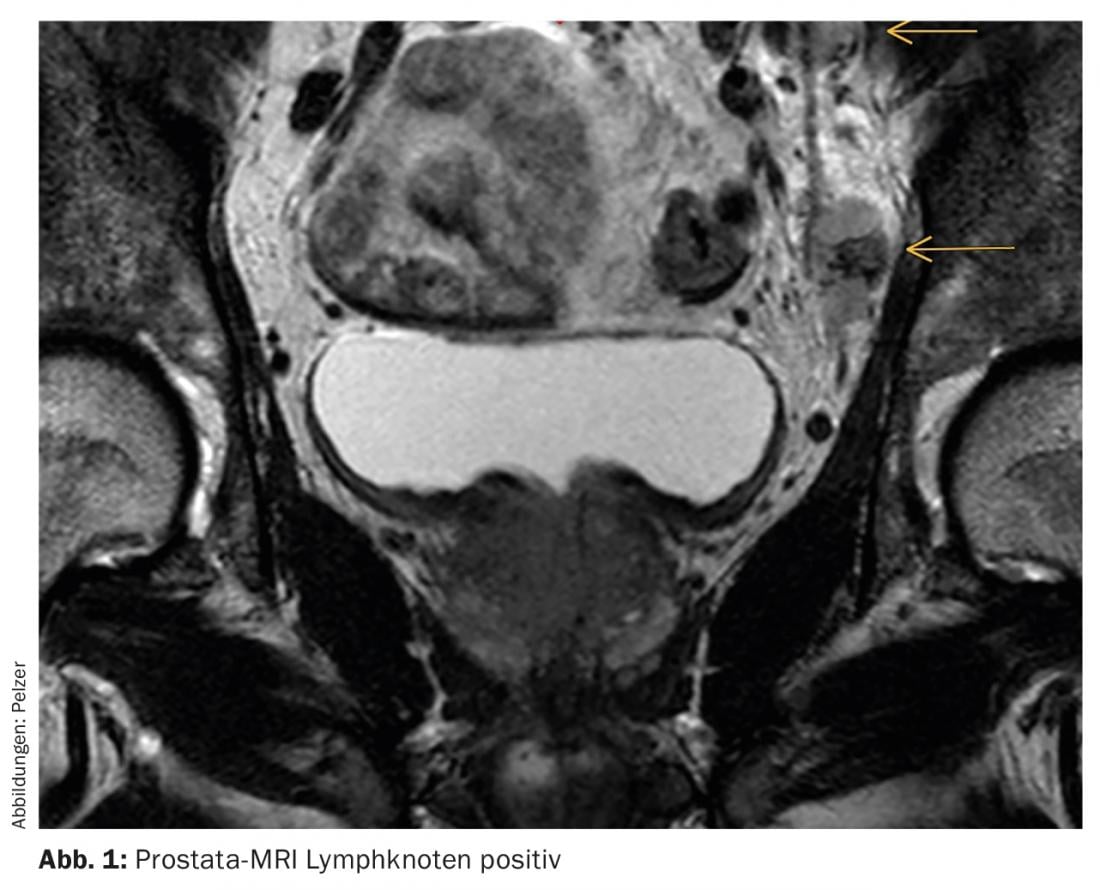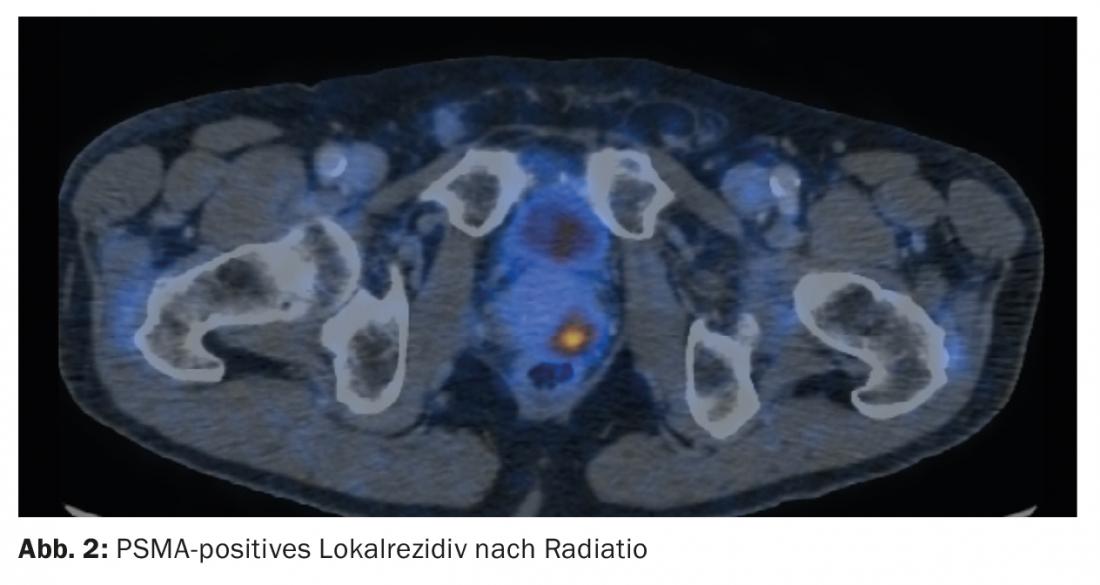For clinically locally advanced prostate cancer, radical prostatectomy and external radiotherapy may be considered. In metastatic prostate cancer, ADT, ADT plus docetaxel, and ADT plus abiraterone and prednisone may be considered.
Prostate cancer is the second most common solid tumor disease in men after lung tumors, with 6200 new cases/year in Switzerland (Krebsligazahlen 2015). Every year, 1300 men die from it. Despite widespread information campaigns by physicians and the media, many patients have advanced tumor stages at the time of diagnosis, which can only be treated with a curative therapy concept to a limited extent.
Prostate specific antigen (PSA) remains the central marker for the diagnosis and follow-up of prostate cancer. Although transrectal ultrasound has some value in the workup of prostate cancer patients, it cannot replace the gold standard of confirming the diagnosis of carcinoma by prostate biopsy, nor is it suitable as a screening examination. The low sensitivity of CT scanning with respect to locoregional tumor extent also makes this procedure unsuitable for primary staging. CT and MRI are on par in the evaluation of lymph node status (Fig. 1). Specially trained radiologists can use the PI-RADS classification to grade how suspicious a lesion in the prostate looks on MRI, with a PI-RADS 1 a “very likely benign” and PI-RADS 5 characterized a “highly likely malignant” lesion within the prostate. Particularly in the context of MRI/ultrasound-fused biopsy procedures, the information obtained in this way serves as an aid to the urologist.

Once the diagnosis of locally advanced prostate cancer is confirmed by biopsy and imaging, radical prostatectomy with (extended) lymphadenectomy is the treatment option of choice, along with radiotherapy, as the curative intended therapy.
Radical prostatectomy for locally advanced prostate cancer.
Cancer-specific survival ten years after radical prostatectomy for locally advanced prostate cancer ranges from 87% to 90% in representative studies, with oncologic outcome depending on the level of PSA before initiation of therapy, Gleason score, TNM stage, and R status [1]. A study published in 2016 by Gandaglia et al. showed an advantage of active tumor therapy over a conservative approach, especially in patients with high Gleason score (8-10) and/or T3b/T4 findings [2]. Data on functional outcome after curative therapy are not yet available in a conclusively representative manner. However, preliminary evaluations tend to show that continence and erections are slightly worse than when localized tumor stages are treated.
Radiotherapy for locally advanced prostate carcinoma
Besides radical prostatectomy, high-dose radiotherapy in combination with androgen suppression in curative intention is a valid alternative. The significance of lymphadenectomy – as usually performed in radical prostatectomy for locally advanced prostate cancer – as well as radiatio of the pelvic lymphatics in its influence on overall survival and recurrence-free survival has not yet been conclusively clarified [3].
Recurrence diagnostics
The rate of biochemical PSA recurrence in patients treated with locally advanced prostate cancer ranges from 15% to 40%. In the context of recurrence diagnosis, choline PET-CT and, more recently, PSMA PET-CT (Fig. 2) are playing an increasingly important role in differentiating whether a biochemical recurrence is local or systemic. PSMA (prostate specific membrane antigen) currently appears to be the most promising marker molecule in tumor-specific imaging of prostate cancer. Radioactively labeled PSMA ligands in the context of PSMA-MR/PET examination reveal tumors more accurately than mpMRI. Data for PSMA-PET-CT are still insufficient for monitoring success during the course of anti-hormonal therapy [4].

Metastatic prostate cancer
Until now, anti-hormonal therapy with LHRH analogues or LHRH analogues plus antiandrogens was considered the standard therapy for metastatic prostate cancer.
However, recent studies have recently shown a relevant survival benefit in young and fit patients when ADT therapy is combined with chemotherapy (docetaxel) (STAMPEDE, CHAARTED) [5]. In addition, combination therapies with ADT and abiraterone (STAMPEDE, LATITUDE) or enzalutamide have also become established in metastatic prostate cancer.
Cytoreductive radical prostatectomy for primary metastatic prostate cancer.
In analogy to renal cell carcinoma, in recent years it has also been propagated in prostate carcinoma that treatment of the primarius could positively influence the course of the disease even in a metastatic setting.
Retrospective studies suggest a survival benefit and a reduction or even avoidance of local secondary complications for cytoreductive radical prostatectomy in primary metastatic prostate cancer. Results of prospective studies are awaited. Patients after radical prostatectomy showed a significantly lower rate of secondary complications [6]. The G-RAMPP trial, which is evaluating oncologic outcomes in oligometastatic patients (maximum 1-5 osseous metastases) and comparing patients on anti-hormonal therapy to those on anti-hormonal and cytoreductive therapy, is expected to deliver initial results in late 2018. The multicenter study initiated by the Martini Clinic in Hamburg is to be launched soon in Switzerland at the Lucerne Cantonal Hospital and at the University Hospital of Geneva, following review and an ethics vote. Whether this method, similar to the treatment of metastatic renal cell carcinoma, will find its way into the guidelines remains to be seen at this point in time. It is currently reserved for study situations and individual treatment concepts.
Castration-resistant prostate cancer
In the castration-resistant situation, other options for extending therapy are found in addition to the recommendation for treatment with abiraterone. Thus, systemic therapy using docetaxel or sipuleucel-T can be discussed with the patient. In addition, there is a recommendation for alpharadin in symptomatic patients with osseous but no visceral metastasis for first-line and second-line therapy. Alpharadin emits alpha rays during its decay, the range of which is <100 ym. The intravenously administered agent accumulates in the bones and leads to definitive double-strand breaks on the DNA and thus to cell death. The therapy lasts 24 weeks (six injections every four weeks). The effect is independent of any prior chemotherapy with docetaxel. In studies, therapy prolonged median survival by 3.6 months and delayed time to external radiotherapy for symptomatic metastases, occurrence of pathologic fractures, or surgical intervention by 5.8 months [7].
Summary
In clinically locally advanced prostate cancer (from cT3), local therapy can be discussed with the patient. Patients need to be oriented about the relatively high rate of biochemical recurrence (between 15-40%). According to current data, both radical prostatectomy and external radiotherapy can be offered for local tumor therapy. Active tumor therapy by radical prostatectomy is superior to a wait-and-see approach in terms of oncologic outcome. In addition, local, tumor-specific complications can be prevented. Radiotherapy must be given at a sufficiently high dose (74-78 Gy in conventional fractionation) and in combination with long-term antiandrogen therapy (two to three years total duration). A multimodal therapy concept must be discussed in the tumor board and discussed with the patient. The patient must also be informed about the perioperative morbidity and the slightly worse functional results with curative therapy of advanced prostate carcinomas.
The clinical and laboratory PSA course, together with the histopathological findings in the interdisciplinary discussion, determines the possible recommendation for adjuvant or salvage therapy. Any PSA persistence after therapy and any PSA rise above 0.2 ug/L after radiotherapy warrants reevaluation.
In addition to PET-CT, PSMA-PET-CT is gaining increasing importance in recurrence diagnostics, since most prostate carcinomas express PSMA.
In metastatic prostate cancer, ADT, ADT plus docetaxel, and ADT plus abiraterone and prednisone are used. Patients with high metastatic burden appear to benefit more markedly from ADT/chemotherapy combination. First-line treatment options in patients with symptomatic metastatic disease include docetaxel, abiraterone therapy, or radium-233 (Alpharadin). Alpharadin reduces bone pain in osseous metastatic prostate cancer, improves quality of life, and prolongs time to intervention for metastasis-related pain or complications.
Take-Home Messages
- In clinically locally advanced prostate cancer (from cT3), local therapy can be discussed with the patient.
- According to current data, both radical prostatectomy and external radiotherapy can be offered for local tumor therapy.
- Radiotherapy must be given at a sufficiently high dose and in combination with long-term antiandrogen therapy (ADT).
- In metastatic prostate cancer, ADT, ADT plus docetaxel, and ADT plus abiraterone and prednisone are used.
- First-line treatment options in patients with symptomatic metastatic disease include docetaxel, abiraterone therapy, or radium-233 (Alpharadin).
Literature:
- Joniau S, et al: Stratification of high-risk prostate cancer into prognostic categories: a European multi-institutional study. Eur Urol 2015; 67: 157-164.
- Gandaglia G, et al: Survival benefit of definite therapy in patients with clinical advanced prostate cancer: estimation of number needed to treat based on competing-risks analysis. BJU Int 2014; 114: E62-E69.
- Pommier P, et al: Is there a role for pelvic irradiation in localized prostate adenocarcinoma? Update of the longterm survival results of Getug-01 randomized study. Int J Radiat Oncol Biol Phys 2016; 96: 759-769.
- Hope TA, et al: 68Ga-PSMA-11-PET imaging of response to androgen receptor inhibition: first human experience. J Nucl Med 2017; 58: 81-84.
- Sweeney CJ, et al: Chemohormonal Therapy in Metastatic Hormone-Sensitive Prostate Cancer. N Engl J Med 2015; 373: 737-746.
- Steuber T, et al: Does cytoreductive prostatectomy really have an impact on prognosis in prostate cancer patients with low-volume bone metastasis? results from a prospective case-control study. Eur Urol Focus 2017. DOI: 10.1016/j.euf.2017.06.016 [Epub ahead of Print].
- Parker C, et al: Alpha Emitter Radium-223 and Survival in Metastatic Prostate Cancer. N Engl J Med 2013; 369: 213-223.
InFo ONCOLOGY & HEMATOLOGY 2018; 6(1): 15-17.











